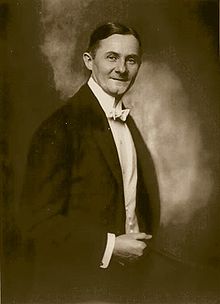Arnold Rieck

Arnold Rieck (born June 22, 1876 in Berlin , † November 7, 1924 in Leipzig ) was a German humorist , couplet singer and actor on the stage and film.
Live and act
Rieck first made a name for himself as a singer of couplets and as a solo entertainer with humorous performances - and thus became the forerunner of the classic stand-up comedian . In 1897 he made his artistic debut in Gera , and since his Berlin debut in 1900 at the Apollo Theater, he has mainly worked on theaters in the capital. He started his most successful time as the star of the Berlin Thalia Theater, where he could be seen in such popular comedies as Charley's aunt .
According to his own information, Rieck is considered the first German stage actor who claims to have turned to film. He was seen as the title hero in probably z. Short grotesque stripes from the turn of the century such as The Geck in the Ladies Bath and Piefke with the Flea . Initially, Rieck received a dozen records per day of shooting instead of payment, later his first fee was 18 marks per day for three days of shooting. Rieck was, along with Guido Thielscher , Leo Peukert and Guido Herzfeld , a parade representative of the early Kintoppklamauks. In numerous short films, especially during the First World War, he amused himself as a rigid, comical guy in an ancient guise, with whom he knew how to consciously and without fear of exposing himself to ridicule, reminding himself of times long ago.
Shortly after the end of the First World War, this kind of humor had survived and more subtle comedians - especially from abroad such as Charles Chaplin and Buster Keaton - dominated the German screen. In the 1920s, Rieck concentrated again on his work on the stage and worked as a humorist at Berlin's Komische Oper and at the New Operetta Theater in Leipzig, where he also died.
Rieck left sound recordings on gramophone / zonophone records and Edison cylinders.
Films (selection)
- 1906: The five senses
- 1909: Age does not protect against folly
- 1909: Big laundry
- 1910: It would have been so nice
- 1915: Musketeer Kaczmarek
- 1916: Papa is not supposed to get married
- 1916: Lehmann's bridal trip
- 1917: The steadfast Benjamin
- 1917: The irresistible Theodor
- 1917: The cousin from Mexico
- 1917: Mrs. Lene's divorce
- 1917: Violet No. 4
- 1918: The false Demetrius
- 1918: Emmahu, the horror of Africa
- 1918: The black curl
- 1918: Didn't you see Fritzchen?
- 1919: The man without a memory
- 1919: Killemann has a slap
- 1920: Arnold on the bridal show
- 1921: It comes from love
- 1922: Yvette, the fashion princess
- 1922: Se. Excellency the Auditor
- 1922: The woman on the panther
- 1924: mother and child
Audio documents
- Without men, from “Doktor Klapperstorch”, sung by Emmy Wehlen and Arnold Rieck. Zonophone Record X-24 349, up. 1909 (youtube.com)
- Village music (the trumpeter blows trara) from the operetta “Polish Economy” by Jean Gilbert. Helene Ballot and Arnold Rieck from the Thalia-Theater, with Dacapo Orchestra Berlin. DACAPO-Record D-2544 (Matr. 2544), apply. 1910 (youtube.com)
- The village music. Vocal duet Frieda Cornetti and Arnold Rieck. Edison Amberol # 15 131: 1910. (ucsb.edu)
- Come, my darling, to the Lunapark, duet from the operetta “Polish Economy” (Jean Gilbert) Lina Goltz and Arnold Rieck. Edison Amberol (wax) # 4-15 130. (archive.org)
- The girls love it so much, duet from "Das Autoliebchen" (music: Jean Gilbert, text: Alfred Schönfeld) Eugenie Della-Donna and Arnold Rieck with orchestra. Concert Record Gramophone 11 579, 944.395 (Matr. 13 723 k) - aufgen. 1912. (youtube.com)
- Hubby since I've known you! Duet from the popular “Kam'rad Männe” (Max Winterfeld - Alfred Schönfeld) Lotte Werkmeister and Arnold Rieck. Record Zonophon 18 044, open. 1914. (youtube.com)
literature
- Berthold Leimbach: audio documents of cabaret and their interpreters 1898-1945. Self-published, Göttingen 1991, OCLC 1072532296 .
- Movie star. Richter's Handbook of Actors, Directors and Writers of Film. Volume 4, 1921/1922, ZDB -ID 1342234-0 , p. 88.
- Friedrich von Zglinicki: The way of the film. History of cinematography and its predecessors. Rembrandt Verlag, Berlin 1956, p. 384.
Web links
- Arnold Rieck in the Internet Movie Database (English)
- Arnold Rieck at filmportal.de
- Arnold Rieck at The German Early Cinema Database
Illustration
- Arnold Rieck in the silent film "Arnold auf Brautschau". Bolten-Baeckers-Film, 1922 in the German Digital Library
- Drawing of the singer Helene Ballot.
| personal data | |
|---|---|
| SURNAME | Rieck, Arnold |
| BRIEF DESCRIPTION | German actor |
| DATE OF BIRTH | June 22, 1876 |
| PLACE OF BIRTH | Berlin |
| DATE OF DEATH | November 7, 1924 |
| Place of death | Leipzig |